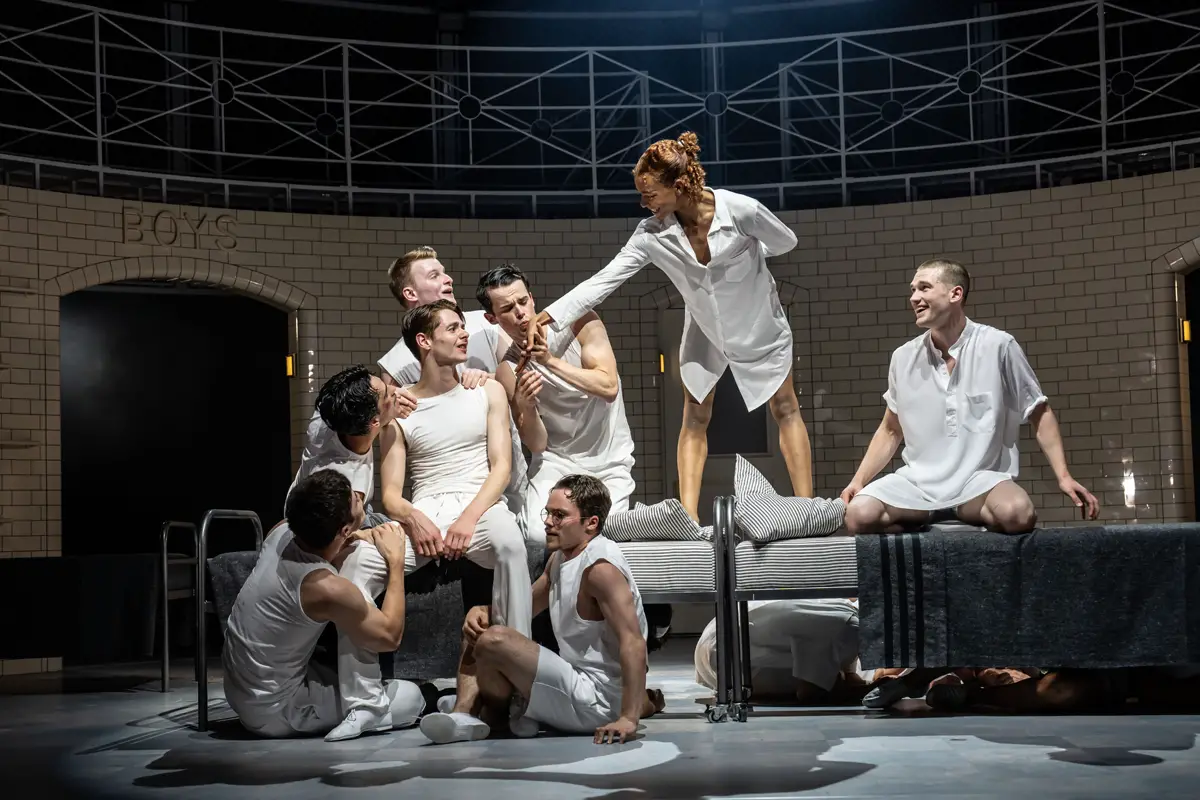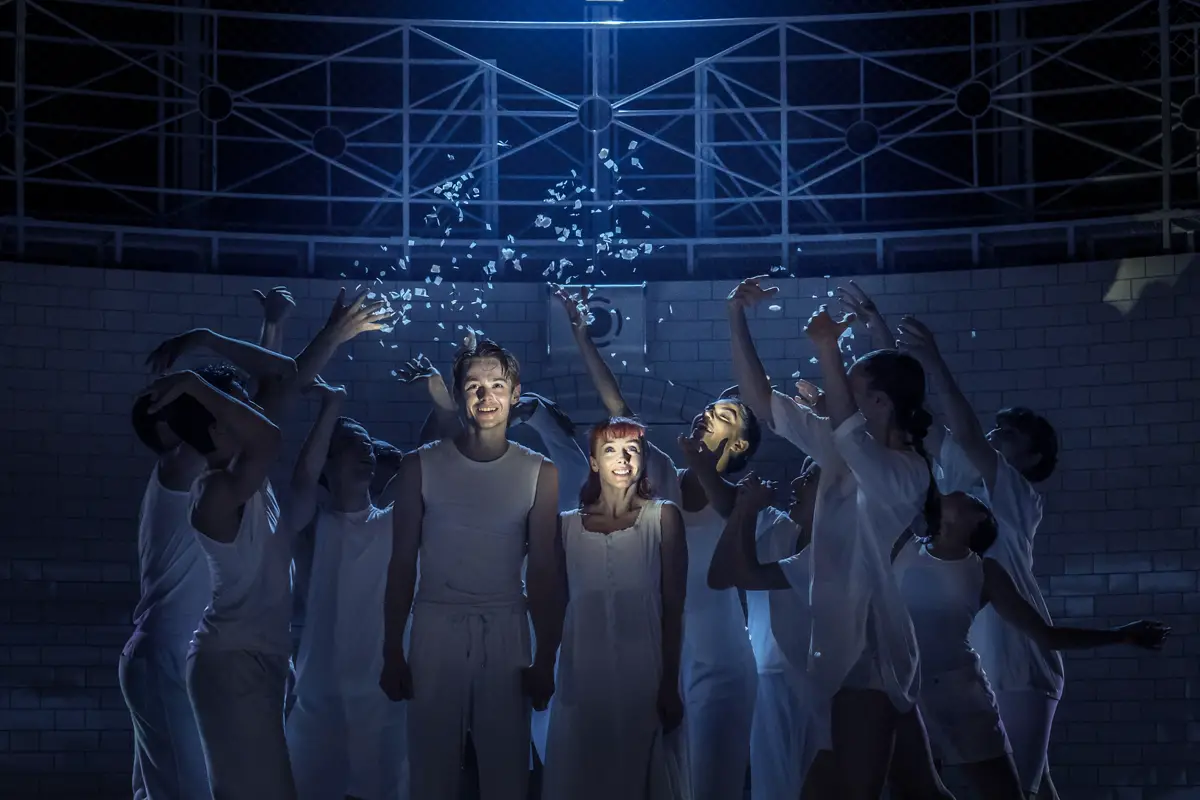Matthew Bourne’s Romeo & Juliet – Review – Sheffield Lyceum Theatre

By Clare Jenkins, October 2023
Well, it’s Romeo and Juliet, all right, but not the ballet as we’ve usually known it. Gone are the Montagues and Capulets and their deadly rivalry. Gone is the sense of ‘fair Verona’ and the opulent houses of wealthy Renaissance Italians, with their servants, musicians, masked balls and orchards. Gone are the doting, clucking nurse, and the kindly Friar Laurence.
In their place: a starkly clinical asylum-cum-house of correction, all cold white tiles, barred rooms and steel staircases. A bullying, sexually rapacious security guard called Tybalt (a chillingly thuggish performance by the muscular Danny Reubens). A traumatised Juliet. And a flaky female prison chaplain (Cordelia Braithwaite) who conjures up spiritual light in the form of a disco glitterball.
This is Romeo and Juliet redefined for a #MeToo generation consumed by concerns about mental health and toxic masculinity. Hence the asylum, where a cast of white-clad young people dance robotically with rigid, jerky movements, or rock in distress, thumb-sucking and twitching. There’s more than a hint of One Flew Over the Cuckoo’s Nest in these scenes of incarceration, not least the Nurse Ratched figure.
In choreographer Matthew Bourne’s radical reworking, it’s also a bold, brilliantly executed, brutal and blood-stained dance drama version of Shakespeare’s tragic tale of star-crossed lovers. Terry Davies’s edgy, at times discordant, reworking of Prokofiev’s score, together with Lez Brotherston’s set, the use of searchlights and institutional alarms and sirens, all add to the sense that these young people are powerless against the forces of oppression: in this case, prison wardens, drug-happy doctors and self-obsessed parents (though only the Montagues – Juliet’s Capulet family don’t appear).
“Touching tenderness”
There’s a heavy sense, too, of innocence vs adult exploitation: Romeo is dumped in the Verona Institute by his busy politician parents – cue brief scenes of political rallies and a power couple in dark blue suits.
The only time the (uniformly excellent) dancers change from their white drapes is for the ball scene, when we’re offered marches and marionettes in pretty skirts and fancy dress, dancing stiffly with mad eyes and fixed smiles. Into their midst arrives Romeo (Paris Fitzpatrick, tall, gangling, sensitive). As the ensemble strut like clockwork figures around the stage, he and Juliet (a marvellously fluid, if rather expressionless, Monique Jonas) waltz and weave slowly together in a chaste trance.
Later, there’s a touching tenderness in their rapture as they mould their bodies together in lifts, tumbles, rolls, across and over the set, the floor, the wall ladders, the staircases… And engage in surely the most protracted kiss in ballet history.
Their pas de deux are framed by wonderfully physical ensemble work from the New Adventures company, registering impotent attempts at individuality and rebellion in a flick of their hair, swiftly exchanged glances, angry stomps.
“A shock”
When the wardens disappear, though, the action becomes literally unbuttoned. Prokofiev’s unsettling ‘Dance of the Knights’ turns into raw, raunchy sexuality as the youthful dancers fasten sinuously onto each other. Until, that is, a drunken Tybalt returns to threaten and finally kill Mercutio (the supremely agile Ben Brown, impotent rage in a fetching kilt).
By the time of his own death, Tybalt is a homophobic monster unleashed, drunkenly flailing about the floor, the inmates’ laughter adding to his torment. Romeo and Juliet jointly strangle him as the mob bay for blood, and Balthasar (Jackson Fisch) writhes in demented mourning for Mercutio, his lost love.
The second act suffers slightly from the lack of variety in its settings and themes – of interfamilial relationships, the warmth of Friar Laurence and the nurse, of Juliet’s self-induced coma on the eve of her wedding, her subsequent ‘funeral’ and Romeo’s suicide. There’s a lot of (superb) flailing around, like so many underwater sea anemones. But there is a shock to the ending, too – and (trigger warning!) much blood.
All told, it’s very much a story for our time, of young people distressed by the adult world and the forces stacked against them. So yes, it’s Romeo and Juliet. But not necessarily as Shakespeare or Prokofiev would know it.
At Sheffield’s Lyceum Theatre until Saturday









